Nursing Report: Operant Conditional Learning Theory and Applications
VerifiedAdded on 2023/01/16
|5
|966
|82
Report
AI Summary
This report delves into the theory of operant conditional learning, a concept rooted in the law of effect and further developed by B.F. Skinner. It explores the core principles of operant conditioning, including reinforcement, punishment, and neutral operants, and how these elements shape behavior. The report provides a detailed theoretical background, referencing key figures like John B. Watson, Edward L. Thorndike, and B.F. Skinner, and explaining the role of consequences in learning. The report also discusses the practical applications of operant conditioning in healthcare settings, such as in the treatment of addiction and obesity. It highlights how rewards and punishments are used to influence patient behavior, promoting healthier choices and aiding in recovery. References to relevant research and studies support the analysis, providing a comprehensive overview of operant learning's significance in nursing practice.
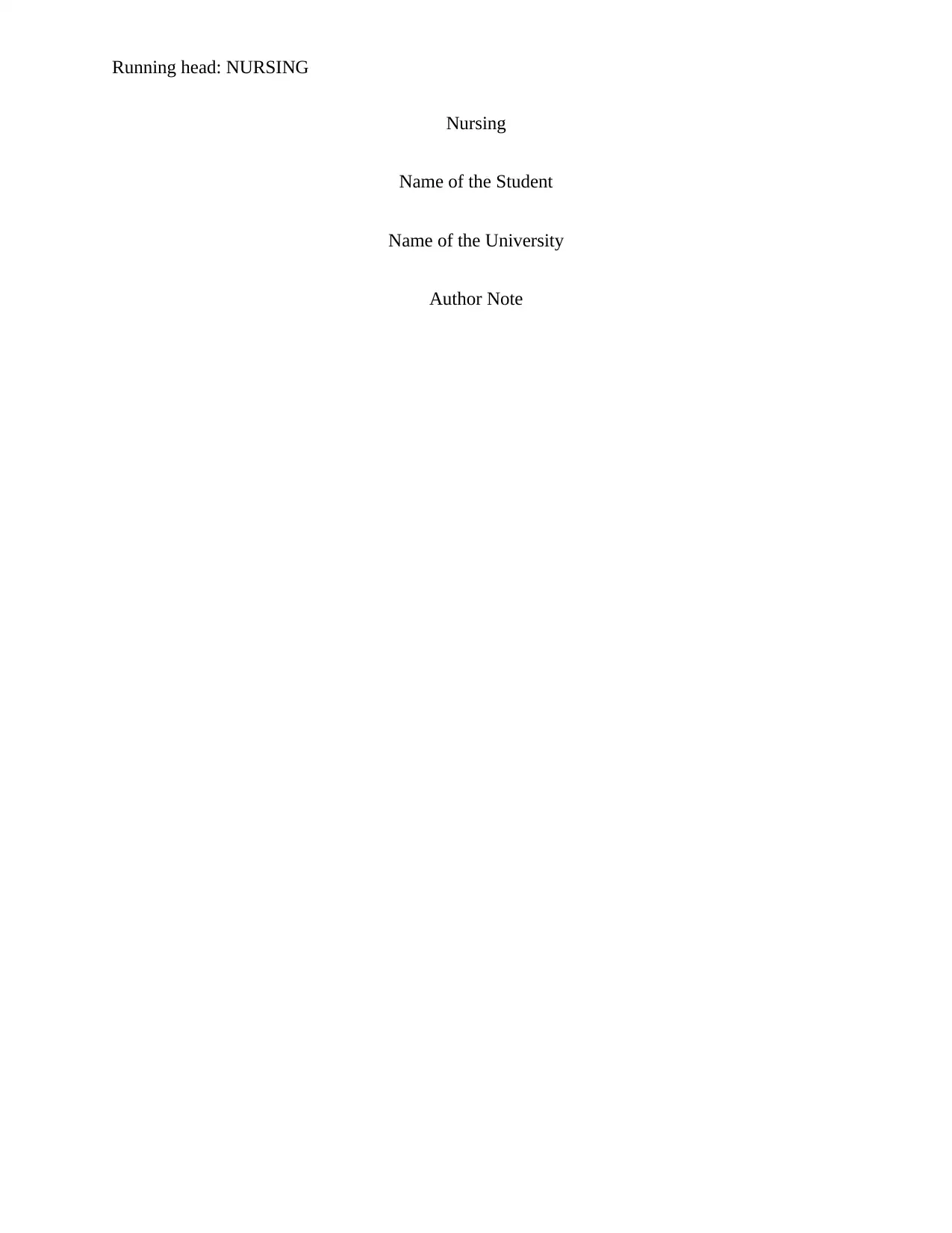
Running head: NURSING
Nursing
Name of the Student
Name of the University
Author Note
Nursing
Name of the Student
Name of the University
Author Note
Paraphrase This Document
Need a fresh take? Get an instant paraphrase of this document with our AI Paraphraser
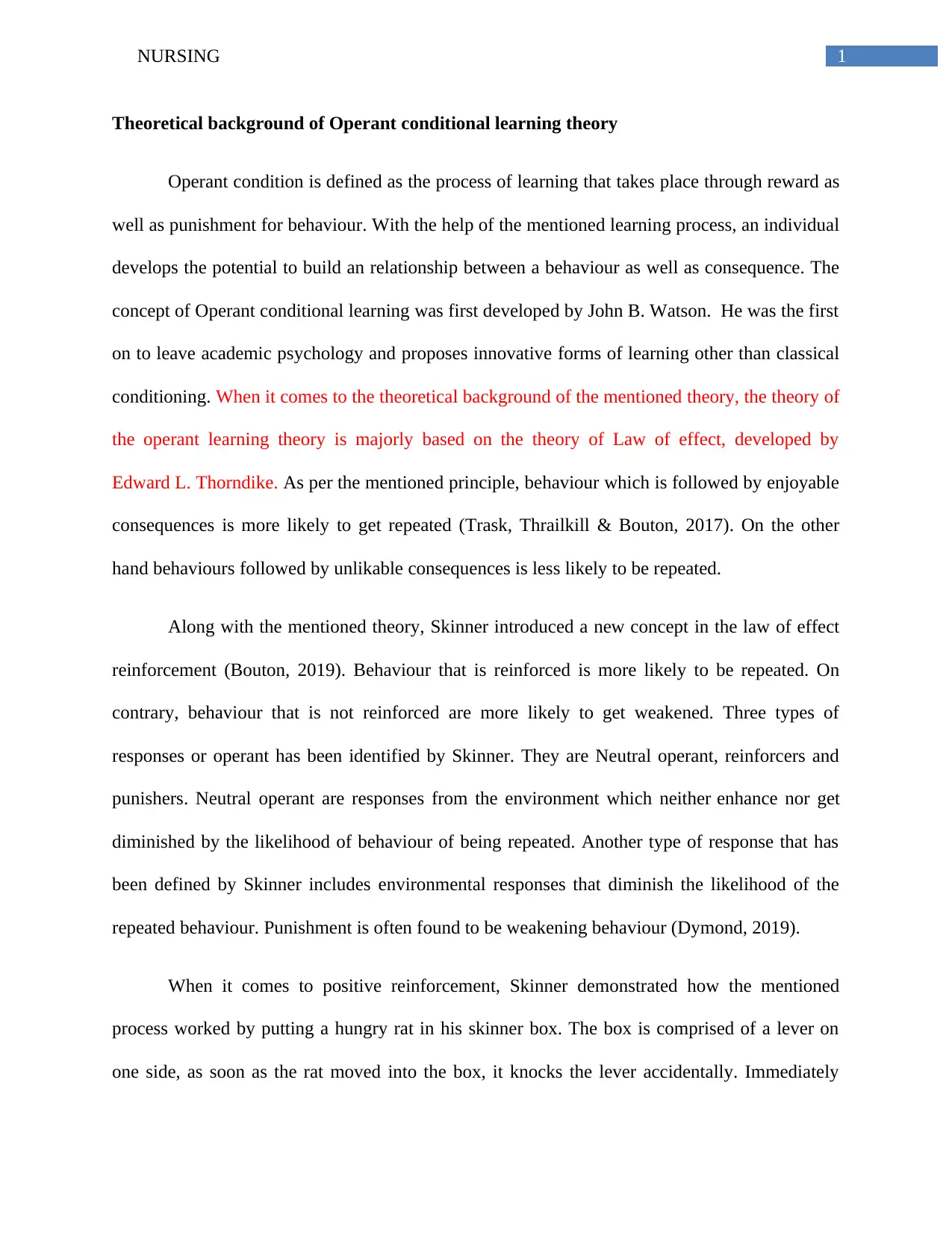
1NURSING
Theoretical background of Operant conditional learning theory
Operant condition is defined as the process of learning that takes place through reward as
well as punishment for behaviour. With the help of the mentioned learning process, an individual
develops the potential to build an relationship between a behaviour as well as consequence. The
concept of Operant conditional learning was first developed by John B. Watson. He was the first
on to leave academic psychology and proposes innovative forms of learning other than classical
conditioning. When it comes to the theoretical background of the mentioned theory, the theory of
the operant learning theory is majorly based on the theory of Law of effect, developed by
Edward L. Thorndike. As per the mentioned principle, behaviour which is followed by enjoyable
consequences is more likely to get repeated (Trask, Thrailkill & Bouton, 2017). On the other
hand behaviours followed by unlikable consequences is less likely to be repeated.
Along with the mentioned theory, Skinner introduced a new concept in the law of effect
reinforcement (Bouton, 2019). Behaviour that is reinforced is more likely to be repeated. On
contrary, behaviour that is not reinforced are more likely to get weakened. Three types of
responses or operant has been identified by Skinner. They are Neutral operant, reinforcers and
punishers. Neutral operant are responses from the environment which neither enhance nor get
diminished by the likelihood of behaviour of being repeated. Another type of response that has
been defined by Skinner includes environmental responses that diminish the likelihood of the
repeated behaviour. Punishment is often found to be weakening behaviour (Dymond, 2019).
When it comes to positive reinforcement, Skinner demonstrated how the mentioned
process worked by putting a hungry rat in his skinner box. The box is comprised of a lever on
one side, as soon as the rat moved into the box, it knocks the lever accidentally. Immediately
Theoretical background of Operant conditional learning theory
Operant condition is defined as the process of learning that takes place through reward as
well as punishment for behaviour. With the help of the mentioned learning process, an individual
develops the potential to build an relationship between a behaviour as well as consequence. The
concept of Operant conditional learning was first developed by John B. Watson. He was the first
on to leave academic psychology and proposes innovative forms of learning other than classical
conditioning. When it comes to the theoretical background of the mentioned theory, the theory of
the operant learning theory is majorly based on the theory of Law of effect, developed by
Edward L. Thorndike. As per the mentioned principle, behaviour which is followed by enjoyable
consequences is more likely to get repeated (Trask, Thrailkill & Bouton, 2017). On the other
hand behaviours followed by unlikable consequences is less likely to be repeated.
Along with the mentioned theory, Skinner introduced a new concept in the law of effect
reinforcement (Bouton, 2019). Behaviour that is reinforced is more likely to be repeated. On
contrary, behaviour that is not reinforced are more likely to get weakened. Three types of
responses or operant has been identified by Skinner. They are Neutral operant, reinforcers and
punishers. Neutral operant are responses from the environment which neither enhance nor get
diminished by the likelihood of behaviour of being repeated. Another type of response that has
been defined by Skinner includes environmental responses that diminish the likelihood of the
repeated behaviour. Punishment is often found to be weakening behaviour (Dymond, 2019).
When it comes to positive reinforcement, Skinner demonstrated how the mentioned
process worked by putting a hungry rat in his skinner box. The box is comprised of a lever on
one side, as soon as the rat moved into the box, it knocks the lever accidentally. Immediately
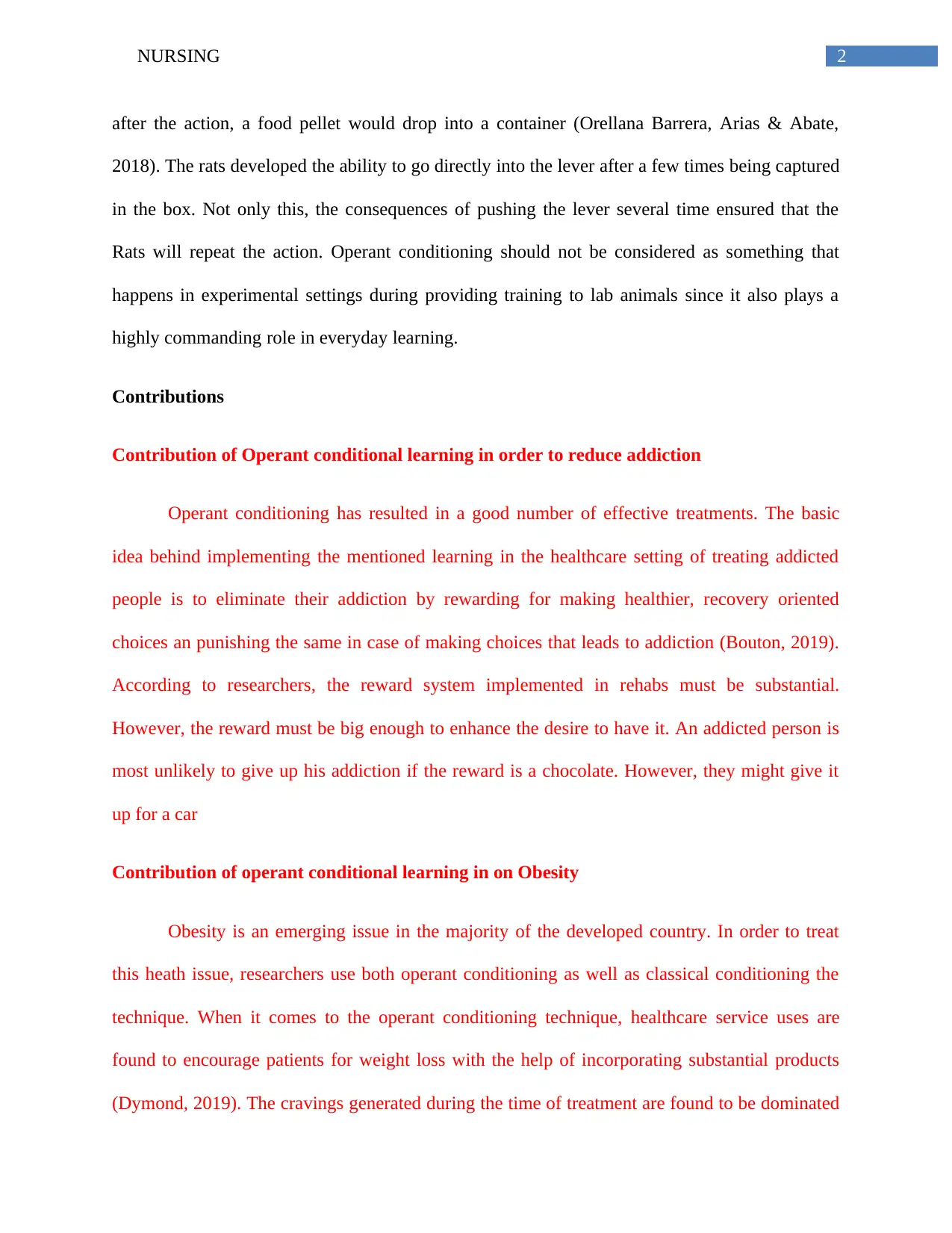
2NURSING
after the action, a food pellet would drop into a container (Orellana Barrera, Arias & Abate,
2018). The rats developed the ability to go directly into the lever after a few times being captured
in the box. Not only this, the consequences of pushing the lever several time ensured that the
Rats will repeat the action. Operant conditioning should not be considered as something that
happens in experimental settings during providing training to lab animals since it also plays a
highly commanding role in everyday learning.
Contributions
Contribution of Operant conditional learning in order to reduce addiction
Operant conditioning has resulted in a good number of effective treatments. The basic
idea behind implementing the mentioned learning in the healthcare setting of treating addicted
people is to eliminate their addiction by rewarding for making healthier, recovery oriented
choices an punishing the same in case of making choices that leads to addiction (Bouton, 2019).
According to researchers, the reward system implemented in rehabs must be substantial.
However, the reward must be big enough to enhance the desire to have it. An addicted person is
most unlikely to give up his addiction if the reward is a chocolate. However, they might give it
up for a car
Contribution of operant conditional learning in on Obesity
Obesity is an emerging issue in the majority of the developed country. In order to treat
this heath issue, researchers use both operant conditioning as well as classical conditioning the
technique. When it comes to the operant conditioning technique, healthcare service uses are
found to encourage patients for weight loss with the help of incorporating substantial products
(Dymond, 2019). The cravings generated during the time of treatment are found to be dominated
after the action, a food pellet would drop into a container (Orellana Barrera, Arias & Abate,
2018). The rats developed the ability to go directly into the lever after a few times being captured
in the box. Not only this, the consequences of pushing the lever several time ensured that the
Rats will repeat the action. Operant conditioning should not be considered as something that
happens in experimental settings during providing training to lab animals since it also plays a
highly commanding role in everyday learning.
Contributions
Contribution of Operant conditional learning in order to reduce addiction
Operant conditioning has resulted in a good number of effective treatments. The basic
idea behind implementing the mentioned learning in the healthcare setting of treating addicted
people is to eliminate their addiction by rewarding for making healthier, recovery oriented
choices an punishing the same in case of making choices that leads to addiction (Bouton, 2019).
According to researchers, the reward system implemented in rehabs must be substantial.
However, the reward must be big enough to enhance the desire to have it. An addicted person is
most unlikely to give up his addiction if the reward is a chocolate. However, they might give it
up for a car
Contribution of operant conditional learning in on Obesity
Obesity is an emerging issue in the majority of the developed country. In order to treat
this heath issue, researchers use both operant conditioning as well as classical conditioning the
technique. When it comes to the operant conditioning technique, healthcare service uses are
found to encourage patients for weight loss with the help of incorporating substantial products
(Dymond, 2019). The cravings generated during the time of treatment are found to be dominated
⊘ This is a preview!⊘
Do you want full access?
Subscribe today to unlock all pages.

Trusted by 1+ million students worldwide
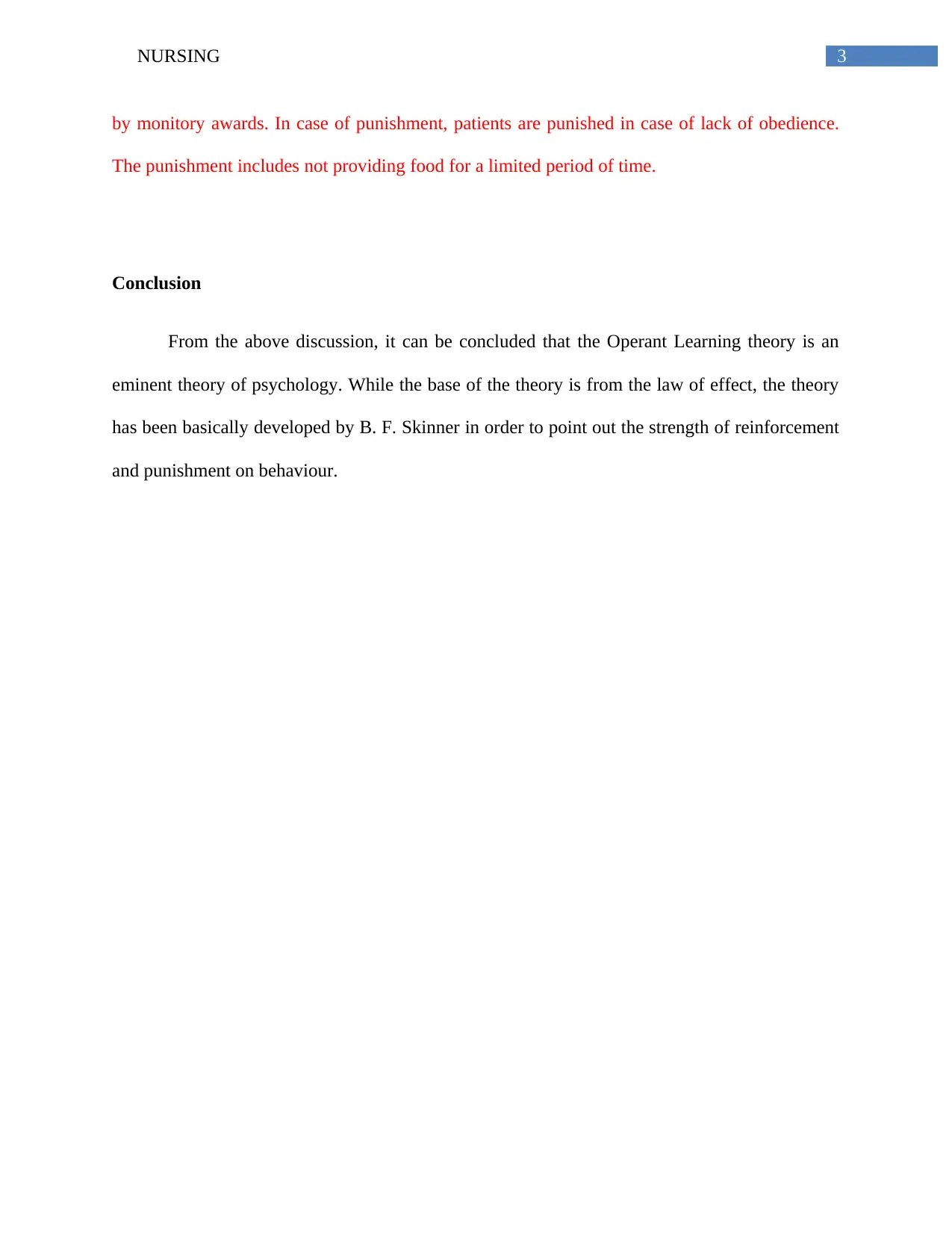
3NURSING
by monitory awards. In case of punishment, patients are punished in case of lack of obedience.
The punishment includes not providing food for a limited period of time.
Conclusion
From the above discussion, it can be concluded that the Operant Learning theory is an
eminent theory of psychology. While the base of the theory is from the law of effect, the theory
has been basically developed by B. F. Skinner in order to point out the strength of reinforcement
and punishment on behaviour.
by monitory awards. In case of punishment, patients are punished in case of lack of obedience.
The punishment includes not providing food for a limited period of time.
Conclusion
From the above discussion, it can be concluded that the Operant Learning theory is an
eminent theory of psychology. While the base of the theory is from the law of effect, the theory
has been basically developed by B. F. Skinner in order to point out the strength of reinforcement
and punishment on behaviour.
Paraphrase This Document
Need a fresh take? Get an instant paraphrase of this document with our AI Paraphraser
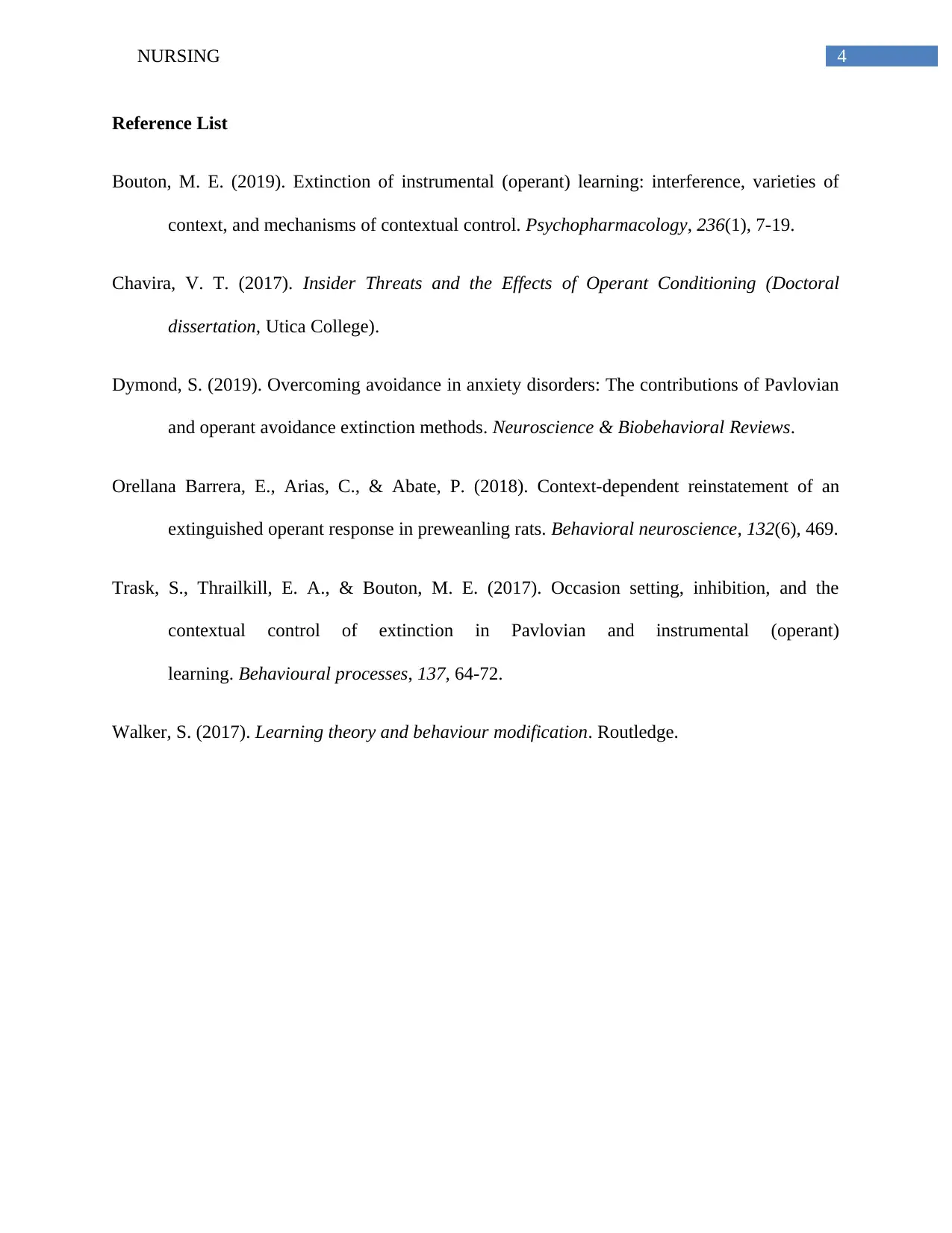
4NURSING
Reference List
Bouton, M. E. (2019). Extinction of instrumental (operant) learning: interference, varieties of
context, and mechanisms of contextual control. Psychopharmacology, 236(1), 7-19.
Chavira, V. T. (2017). Insider Threats and the Effects of Operant Conditioning (Doctoral
dissertation, Utica College).
Dymond, S. (2019). Overcoming avoidance in anxiety disorders: The contributions of Pavlovian
and operant avoidance extinction methods. Neuroscience & Biobehavioral Reviews.
Orellana Barrera, E., Arias, C., & Abate, P. (2018). Context-dependent reinstatement of an
extinguished operant response in preweanling rats. Behavioral neuroscience, 132(6), 469.
Trask, S., Thrailkill, E. A., & Bouton, M. E. (2017). Occasion setting, inhibition, and the
contextual control of extinction in Pavlovian and instrumental (operant)
learning. Behavioural processes, 137, 64-72.
Walker, S. (2017). Learning theory and behaviour modification. Routledge.
Reference List
Bouton, M. E. (2019). Extinction of instrumental (operant) learning: interference, varieties of
context, and mechanisms of contextual control. Psychopharmacology, 236(1), 7-19.
Chavira, V. T. (2017). Insider Threats and the Effects of Operant Conditioning (Doctoral
dissertation, Utica College).
Dymond, S. (2019). Overcoming avoidance in anxiety disorders: The contributions of Pavlovian
and operant avoidance extinction methods. Neuroscience & Biobehavioral Reviews.
Orellana Barrera, E., Arias, C., & Abate, P. (2018). Context-dependent reinstatement of an
extinguished operant response in preweanling rats. Behavioral neuroscience, 132(6), 469.
Trask, S., Thrailkill, E. A., & Bouton, M. E. (2017). Occasion setting, inhibition, and the
contextual control of extinction in Pavlovian and instrumental (operant)
learning. Behavioural processes, 137, 64-72.
Walker, S. (2017). Learning theory and behaviour modification. Routledge.
1 out of 5
Related Documents
Your All-in-One AI-Powered Toolkit for Academic Success.
+13062052269
info@desklib.com
Available 24*7 on WhatsApp / Email
![[object Object]](/_next/static/media/star-bottom.7253800d.svg)
Unlock your academic potential
Copyright © 2020–2026 A2Z Services. All Rights Reserved. Developed and managed by ZUCOL.





